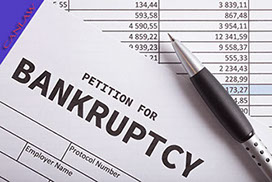Considering Bankruptcy?
CanLaw Can Help
 Bankruptcy is a solution,
Bankruptcy is a solution,
not a problem
125,000 People Declare Bankruptcy
each year. You are not alone
WHAT ARE THE CONSEQUENCES OF BANKRUPTCY?
Going bankrupt is a solution to your money problems. It erases most of your debt and gives you a clean fresh start. Over 250,000 people go bankrupt in Canada each year.
Bankruptcy will stop the collections calls, end your debt problems and financial problems. When you can't pay bills, meet your monthly payments, have garnished wages, bad credit missed payments bankruptcy may be the right answer for you.
If you have debts, but no savings, no money and are in overdraft, or at your credit limit with judgments it is time to consider bankruptcy. Credit counselling is a poor solution since you are left with the same debt, spread over a longer period. A consumer proposal may be an interim solution if you can meet the conditions and obligations to make lower payments without missing any.
Ask A Bankruptcy Lawyer
PROS
Although you give up a part of your surplus income during the bankruptcy period, it is significantly less than the total required payments to your creditors prior to the bankruptcy
Your creditors are not allowed to start new legal actions or to continue existing ones against you
The collection calls will stop. Collection agencies are not allowed to try and collect your discharged debts
You are entitled to keep certain property
You will be discharged from all or a significant part of your existing debts and get a fresh start, debt free.
Bankrupts can often re-establish credit within a year or so of being discharged.
CONS
Some debts cannot be eliminated and still have to be repaid even after a discharge order is made These include:
- Student loans that are less than 7 years old (if loans are between 5 and 7 years old, the trustee could make a hardship application to have them included)
- Government over payments, e.g. if you were paid too much in EI benefits, you will still need to repay the surplus
- Child support payments or arrears
- Spousal support / alimony payments or arrears
- Court ordered fines and restitution payments
- Debts resulting from fraudulent activities
You must give up the legal title and control of non-exempt property. Your Trustee will advise you exactly what you lose before you actually make a decision to go bankrupt.
Bankruptcy will be shown on your credit rating for as long as seven years after discharge for a first bankruptcy and up to fourteen years on the second bankruptcy.
You will lose some professional and civil privileges, such as capacity to hold money in trust, capacity to be elected to certain civil positions
Bankruptcy still carries a negative stigma.
You will lose part of any surplus income and all property received before discharge, which is transferred to your trustee for distribution among your creditors
You will lose part of the income and property and may have to lower your standards of living for a while.
Contractors may suspend and cancel the services where there is a contractual ipso facto clause allowing contractors to cancel the contract on bankruptcy
You will have limited contractual capacity, debtor’s contracts are subject to a review by a trustee in bankruptcy.
Bankrupt has duties to perform before the discharge. If the discharge is conditional, some duties or conditions may be imposed after the discharge depending on the findings of the Court
CANLAW
DIRECTORY
OF BANKRUPTCY
LAWYERS
72000 Listings
